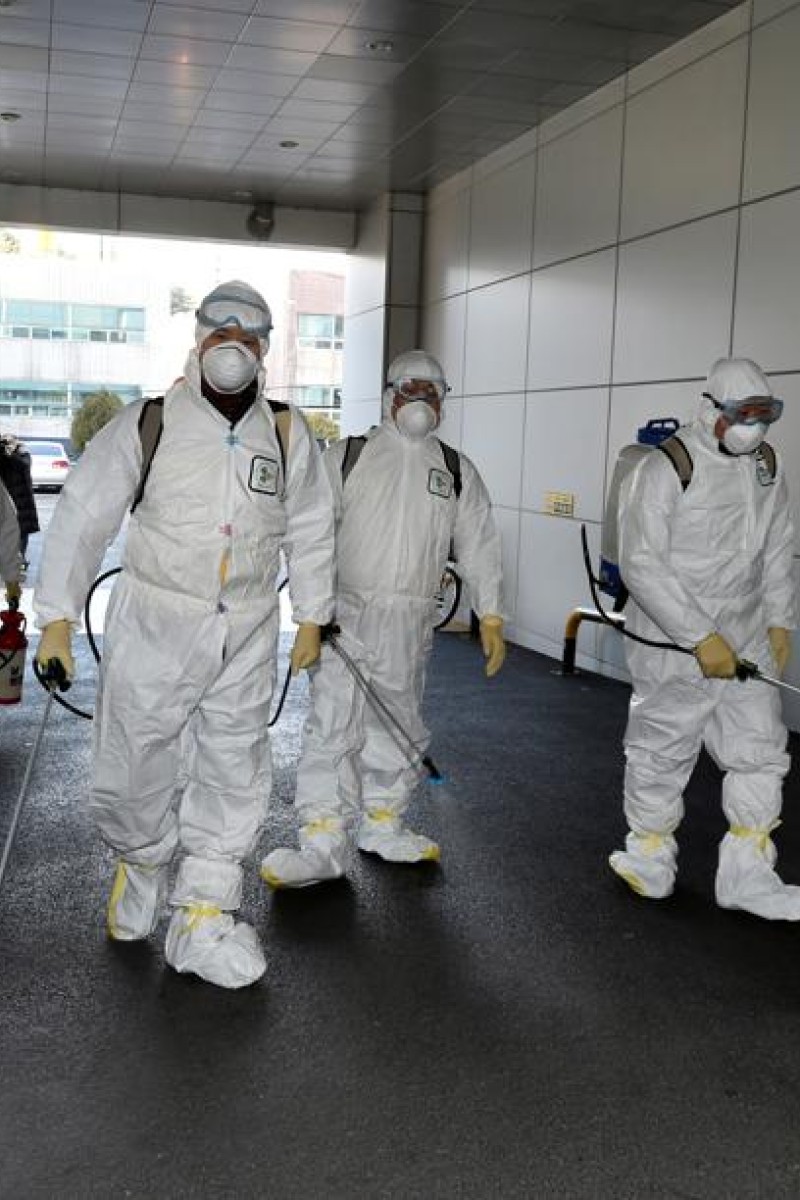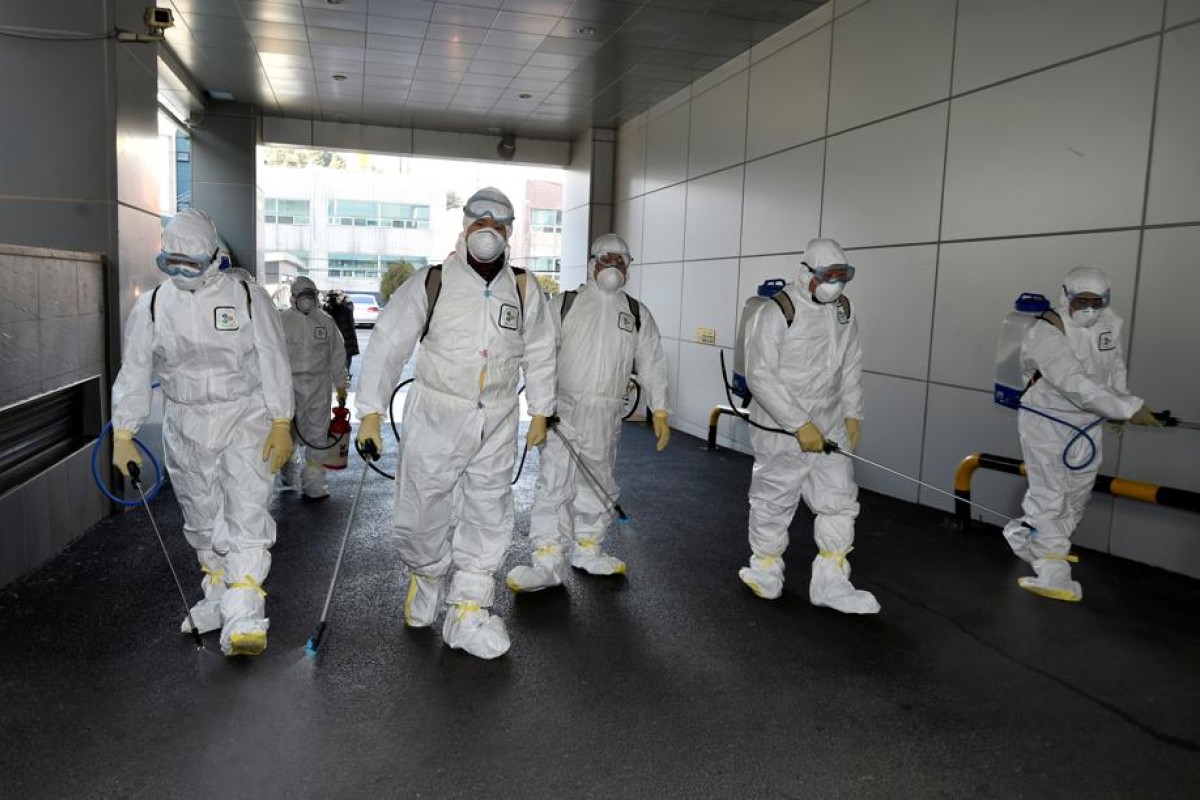
As a religious group in South Korea is accused of intentionally spreading the coronavirus, let's take a look at other organisations on the continent that have made waves
 Workers from a disinfection service company sanitise a branch of the Shincheonji Church of Jesus the Temple of the Tabernacle of the Testimony where a woman known as "Patient 31" attended a service in Daegu.
Workers from a disinfection service company sanitise a branch of the Shincheonji Church of Jesus the Temple of the Tabernacle of the Testimony where a woman known as "Patient 31" attended a service in Daegu.A cult is a religious group that is often highly secretive and deviates from the norm. There is generally one leader in charge, who proclaims themself to be either the saviour of the world, or says that you need to listen to them in order to know salvation. Asia has had its share of cults, including these that have made the news and often, caused chaos.
Shincheonji Church of Jesus
Country: South Korea
The secretive Shincheonji Church of Jesus, considered by many mainstream churchs in Korea to be a cult, has been in the news lately, as it’s ground zero for the coronavirus outbreak in the country. Members of the church, as well as their relatives and others who got the virus from them, account for about 60 per cent of those infected.
The church is based in Daegu and has nearly 250,000 members, mostly in Korea. It preaches the end of the world.
Its founder, Lee Man-hee, says he is the second coming of Jesus and can only take 144,000 people to heaven with him on Judgement Day.
Chuch members are not allowed to wear face masks, for example for medical reasons such as the coronavirus, with the leader saying that doing so is disrespectful to God, and they are not allowed to miss church due to medical appointments or illness. To people within the church, getting sick is a sin, because it prevents them from doing God’s work.
South Korea will test 200,000 members of the church for the virus after its leader agreed to hand over a list of members to health authorities. There are rumours surfacing that members of the church are intentionally trying to spread the virus to other churches, so as to minimise the exposure and blame they’re currently receiving.
Breaking news! and other terms that will help you understand the news better
Yongsae-gyo (Church of Eternal Life)
Country: South Korea
In 2016, media companies in South Korea began investigating then-president Park Geun-hye’s relationship with Choi Soon-sil, the daughter of the late Choi Tae-min. The elder Choi was the leader of the Church of Eternal Life, a cult that combined elements of Buddhism, Christianity and traditional Korean Shamanism.
Choi was also an associate of former president Park Chung-hee, Park Geun-hye’s father, who was assassinated in 1979, but he also befriended Park Geun-hye shortly after her mother was assassinated in 1974, claiming he could see her mother in his dreams. He remained her mentor until his death. She also became good friends with his daughter, who had no official government position, but had access to confidential documents and information meant for the president.
Choi and members of Park Geun-hye’s senior staff used their influence to extort billions of dollars from Korean businesses, and Choi Soon-sil used her influence to obtain a place in an elite university for her daughter.
Park Guen-hye was impeached and arrested for her actions.
Aleph (Formerly known as Aum Shinrikyo)
Country: Japan
Cults tend to have something in common, and that’s a belief in doomsday, or the end of the world. This cult, founded in 1984 by Shoko Asahara, believed that the end of the world was coming and those not in the cult would go to hell – unless they were killed by cult members.
Followers of the cult were responsible for Japan’s worst terror incident when, on March 20 1995, they released poisonous sarin gas on the subway in Tokyo. Thirteen people were killed and thousands more were injured.
The cult made several other failed attempts in the following months to release other poisonous gases in more subway stations.
Many countries have designated the group a terrorist organisation, and in July 2018, seven members of the cult, including the leader, were executed for their role in the 1995 terror attack.
Tips to tell if you're reading fake news or the real thing
The Church of Almighty God (also known as Eastern Lightning)
Country: China
The movement has been described by Chinese media as the nation’s “most dangerous cult” and has been formally banned in the country since 1995.
Due to its secretive nature, and the fact that it operates underground, researching the group is difficult.
It has been accused of several violent acts, including mass kidnappings in 2002, riots and stabbings in 2012, and the murder of a woman named Wu Shuoyan in 2014 after she refused to give her phone number to “missionaries” from the group.
One of this group’s key beliefs is that Jesus returned to Earth as a Chinese woman to bring about the apocalypse. It often isolates its members from friends and family, and pressures them to give money in exchange for salvation.
The Unification movement (aka Moonies)
Country: South Korea
Officially founded in 1954, the beliefs of the movement are based off a book written by founder Sun Myung-moon called Divine Principle. He claimed to have met Jesus at the age of 16 and to have been chosen as his successor. He also said he spoke to God, Buddha and Moses. His religion mixes together Christianity, Confucianism, Shamanism, and anti-Communism, and he claimed the belief would unite all religions through arranged marriages.
The church is famous for holding mass wedding ceremonies. Moon even entered the Guinness Book of World Records in 1988 when he married 6,516 identically dressed couples in Seoul, and in 2009 he married 45,000 people in simultaneous ceremonies around the world.
He lost many followers after he went to jail in 1984 for tax evasion in the United States. Many people also disapproved of his immense wealth and the lavish lifestyles of his children. He died in 2012, and since then, the goings-on of the church have been largely unknown.
